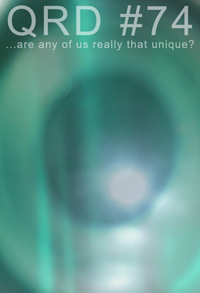
 |
| about
this issue Featured Band Interview: Rivulets Bass Player Interviews: Tony Zanella of +/- Channing Azure of Alpha Cop Eric Baldoni of Colt Vista Jeanne Kennedy Crosby Rob Kohler Derek M. Poteat Guitarist interviews: Campbell Kneale Antony Milton of PseudoArcana Nevada Hill of Bludded Head Malcolm Brickhouse Chvad SB Scott Endres of Make Label Owner Interviews: Russian Winter Records Hello.L.A. Moving Furniture Basses Frequences Saxwand Records Comic Creator Interviews: Richard Van Ingram Tyler Sowles JB Sapienza Troy Vevasis Victor Couwenbergh Terry Hooper Travis Hymel Robert Hendricks Dirk Manning |
 |
 |
 |
 |
 |
 |
 |
|
|
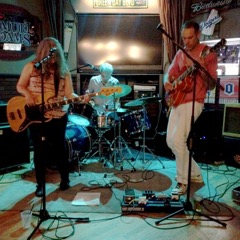 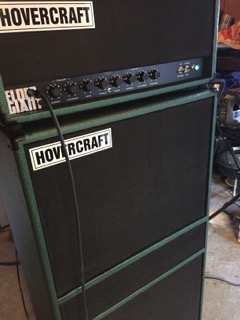 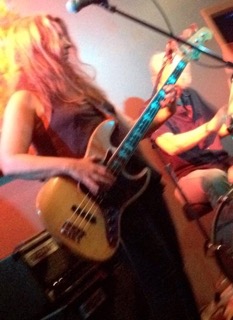 |
July 2015

Bands: Miss Massive Snowflake
Websites: http://missmassivesnowflake.com
QRD – What was your first bass
& what happened to it?
Jeanne – A Samick jazz bass I got in 1995 for Christmas from my at the time boyfriend. He knew I really wanted a bass, so it was the best Christmas present ever. I still have it. I keep it at my parents’ house in South Carolina so when I visit them (I live in Portland, OR) I can practice. For a cheap little bass it’s nice, the neck is great. I had it set up at a good shop & it’s got Thomastik flatwounds on it, like all my basses.
QRD – What’s the most important part of your rig - bass, amplifier, or effects?
Jeanne – Bass. I love the way my basses feel, so they’re fun to play.
QRD – What’s your main amplifier & why?
Jeanne – I just recently got a Hovercraft Custom 200 Watt Elder Giant Tube Amp. It’s got a great overdrive sound option switch with wonderful sustain, but it also has a clean tone sound. I have two matching (metallic green Tolex) cabinets made over for it, one 18 inch reflex cabinet made with an old Acoustic 361 shell refurbished & as a smaller option, my old 15” Ampeg cabinet restored to match the head. They look beautiful on stage & the tone is what I’ve always wanted.
QRD – Do you prefer upright or electric bass?
Jeanne – I only play electric, but I will happily listen to a great upright player any day.
QRD – Do you prefer to use a pick, fingers, or a bow?
Jeanne – Fingers only, it never was required for me to use a pick for any gig or I guess I would try that. I’ve played guitar mostly with a pick.
QRD – Why do you play bass instead of guitar?
Jeanne – Low tones, big sound waves, the vibration you feel standing in front of a bass speaker. I love guitar & I played guitar for years. I’d like to pick it up again, still looking for a guitar that I want to play. Bass is obviously less challenging in the beginning because it has four strings. I always thought guitar was pretty hard, but maybe I should have practiced more. I also like the place of a bassist that is generally not in front. I’m a little shy as a performer, so it was good fit for me right away. Playing bass has made me a much better musician because as soon as I got a bass I was ready to join a band & then I started playing a lot. It helped my confidence & self-consciousness. I don’t know if I’d be a performer now if I had tried to just find my place as a guitarist. Now I feel like I could go back to guitar & be more confident. As a bassist you get to enjoy someone else shredding guitar for you on the bandstand. My bandmate Shane delights me on a regular basis with his guitar playing & performance style. There’s one tune we do live, “Burn Baby Burn”, where he gets on his knees in front of me like I’m his muse bitch-goddess & he rocks out; it’s hilarious, goofy, & also touching because we’re such good friends. Somebody has to play bass, why not me?
QRD – How is a bass different than a guitar other than being lower in pitch?
Jeanne – The role as a rhythm instrument is more foundational. It’s the roots. You have to ground all that flighty treble-y stuff. I like listening to bassists who have solid rhythm, but also play melody & have a lot of expression on the instrument.
QRD – What’s your main bass & what are the features that make it such?
Jeanne – My 1971 Fender Jazz Bass is my main bass. It plays so great; you can feel the wood vibrating even when it’s not plugged in. It’s been played a lot, I’ve had it now 11 years & I’m the third or fourth owner & there’s a somewhat substantiated rumor that Stanley Clarke owned it originally. It’s not too heavy, it always feels great, & sounds like perfection with the new Hovercraft.
QRD – What do you think of the thumb rests on some basses?
Jeanne – Why are they there? Only my first bass had that, brand new from the music store, I took it off right away because someone else told me to.
QRD – How many basses do you own?
Jeanne – Three! The old Fender Jazz, the Samick Jazz, & I also have a 1975 Fender Musicmaster. Also a sweet player, I had it modified a bit, Villex pickup, new bridge.
QRD – What features do you look for when buying a bass?
Jeanne – I don’t want to put it down. When I bought my Fender Jazz I knew immediately it was for me. It wasn’t for sale when I first saw it, it was in a guitar shop getting appraised or worked on or something, hanging on the wall behind the counter, the dealer/shop owner said that he thought maybe it would be going up for sale. He called me very soon after & said it was for sale; he gave me first dibs on it. I had some money to get a nice bass because I sold a vintage guitar that I’d had for a while for $1,400 specifically to get a nice bass & this bass was priced at $1,495.
QRD – How much do you think a good bass should cost?
Jeanne – I don’t know, the ones I tend to want are at least some hundreds of dollars; I paid $500 for the ‘75 Musicmaster. I like vintage basses & vintage instruments in general that have been played & the wood has already conducted a lot of sound. Loosened up. Instruments should be free for people who will play them well & often. I’m a music gear socialist. Musicians need subsidies. Playing music doesn’t pay well in the underground/jazz/anti-commercial art world where I like to hang out. I’ve heard people do amazing things literally with garbage.
QRD – Are you after one particular bass tone & locking into it, or do you like to change your tone around a lot?
Jeanne – I had a good run with the new amplifier with the knobs all just set the same for every song. Overdrive, baby. We just toured & did 18 shows on the west coast all in bass overdrive. Lots of good comments on the tone.
QRD – What are some basses, amps, & pedals you particularly lust after?
Jeanne – It feels good to not want anything right now.
QRD – What do you think are some important features to be on a person’s first bass that aren’t always there?
Jeanne – Flatwound strings & low action set-up worked for me. My first bass teacher, Glen Moore, directed me that way. When I get a new bass it goes right into the shop. A good set-up is so valuable. It can make a cheap, made in China bass feel & sound perfectly adequate for a beginner to get hooked.
QRD – What’s the first thing you play when you pick up a bass?
Jeanne – Usually some run in E, but I’m trying to get a new habit & start with Eb, then work my way down to E.
QRD – How old were you when you started playing bass?
Jeanne – I started playing bass in my early thirties. I started playing guitar when I was twenty.
QRD – Do you feel bass lines should echo & emphasize guitar & drum parts or be their own distinct elements?
Jeanne – Both! Playing with Shane has really helped me hear bass as a compliment & response to his guitar lines. I get to take bass solos in this rock band too. The three-piece ensemble has always been my favorite for this freedom of expression.
QRD – What do you do to practice other than simply playing?
Jeanne – I’ve gotten into learning some jazz chords on piano & singing standards. I like to just mess around on bass & find cool sounds & chord tones. I listen to Carol Kaye’s bass lessons on CD, they’re so good. Carol Kaye is my virtual bass teacher. I’ve had a lot of in-person lessons too.
QRD – How many hours a week do you play bass & how many hours would you like to?
Jeanne – Two or three hours a week is what’s happening right now. Between 10-20 would be awesome. Like when I’m on tour with Miss Massive Snowflake. Lots of band playing & performing on tour, but ideally I’d love to also practice an hour or two every day by myself also.
QRD – How often do you change strings?
Jeanne – The Fender Jazz just had its strings changed for the first time in 11 years.
QRD – How often do you break strings?
Jeanne – I’ve never broken a bass string.
QRD – Which do you feel is more proficient, your strumming/bowing hand or fretting hand & how does that effect your style?
Jeanne – My right hand is maybe the stronger of the two, it still needs the most practice to play fast. I’ve had to work on that.
QRD – What’s a bad habit in your playing you wish you could break?
Jeanne – Mechanical stuff. Keeping my left wrist too flexed, not having my thumb behind what I’m playing, stuff like that. Glen Moore is super into good bass biomechanics & being relaxed when you play, so I got a lot of good form from his lessons. Sometimes my elbows hurt when I start playing a lot, but it goes away as I get stronger. Also, just not being disciplined enough to keep regular practice & creative schedules.
QRD – Playing what other instrument do you think can most help someone’s bass playing?
Jeanne – Piano I think. I make up bass lines on my keyboard.
QRD – Did you ever take bass lessons & if so, what did you learn from them?
Jeanne – I’ve had great teachers, & I always say I’ve disappointed all of them! Not totally, but I never was the most disciplined practicer. Since I started playing bass it’s always been jazz musicians for my sporadic music lessons. The first time I heard Glen Moore I knew I found some jazz that I liked, which many people never do, & I saw him advertise for students a year or two later. He is so cool. He taught me a lot about good form & dexterity, he gave me some effective warm ups, he turned me on to Bill Evans & many great tunes, he got me listening to more jazz & more jazz bass, he showed me the value & intense beauty of simple, fat open string notes & playing in the low register, joyfulness in bass playing, I love that guy. I’ve also learned a lot from Don Corey, my friend Brian Healy who plays in great Brazilian combos, & I’ve had lessons recently from Dave Bones, who plays… jazz trombone! He’s so great, he helped my understanding of theory & I’ve had to work on reading Real Book charts, always worthwhile even though I still suck at it. Being able to read music is like being let into a secret world.
QRD – If a band has good bass work, can you ignore the rest of the band not being good?
Jeanne – I am always rooting for all bands & musicians who are not mean jerks. A good bassist will hold my attention though & maybe they are helping the other musicians learn & get better? I think a lot of times in bands & combos musicians will rise to meet the level of the better players. Jazz has a good legacy, at least here in Portland, of being a teaching & learning genre. There’s seriously nice musicians here too in all types of music. Portland has very supportive & friendly music community.
QRD – What famous musician’s bass would you like to own & why?
Jeanne – I think I own one of Stanley Clarke’s old basses! He probably hardly played it. I heard it was possibly used in a recording session with Chick Corea.
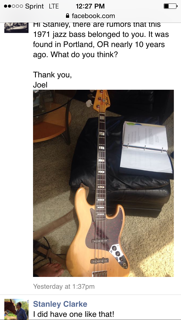
QRD – Who do you think is currently the most innovative bass player & why?
Jeanne – I always love what Mike Watt is doing; his artistry on bass, amazing tone & always doing something new, collaborating with people he meets touring around the world, signature punk rock & jazz style. His combo with two Italian musicians Il Sogno Del Marinaio was the last time I saw him live recently & it’s always worth going out to hear him.
Jeanne – A Samick jazz bass I got in 1995 for Christmas from my at the time boyfriend. He knew I really wanted a bass, so it was the best Christmas present ever. I still have it. I keep it at my parents’ house in South Carolina so when I visit them (I live in Portland, OR) I can practice. For a cheap little bass it’s nice, the neck is great. I had it set up at a good shop & it’s got Thomastik flatwounds on it, like all my basses.
QRD – What’s the most important part of your rig - bass, amplifier, or effects?
Jeanne – Bass. I love the way my basses feel, so they’re fun to play.
QRD – What’s your main amplifier & why?
Jeanne – I just recently got a Hovercraft Custom 200 Watt Elder Giant Tube Amp. It’s got a great overdrive sound option switch with wonderful sustain, but it also has a clean tone sound. I have two matching (metallic green Tolex) cabinets made over for it, one 18 inch reflex cabinet made with an old Acoustic 361 shell refurbished & as a smaller option, my old 15” Ampeg cabinet restored to match the head. They look beautiful on stage & the tone is what I’ve always wanted.
QRD – Do you prefer upright or electric bass?
Jeanne – I only play electric, but I will happily listen to a great upright player any day.
QRD – Do you prefer to use a pick, fingers, or a bow?
Jeanne – Fingers only, it never was required for me to use a pick for any gig or I guess I would try that. I’ve played guitar mostly with a pick.
QRD – Why do you play bass instead of guitar?
Jeanne – Low tones, big sound waves, the vibration you feel standing in front of a bass speaker. I love guitar & I played guitar for years. I’d like to pick it up again, still looking for a guitar that I want to play. Bass is obviously less challenging in the beginning because it has four strings. I always thought guitar was pretty hard, but maybe I should have practiced more. I also like the place of a bassist that is generally not in front. I’m a little shy as a performer, so it was good fit for me right away. Playing bass has made me a much better musician because as soon as I got a bass I was ready to join a band & then I started playing a lot. It helped my confidence & self-consciousness. I don’t know if I’d be a performer now if I had tried to just find my place as a guitarist. Now I feel like I could go back to guitar & be more confident. As a bassist you get to enjoy someone else shredding guitar for you on the bandstand. My bandmate Shane delights me on a regular basis with his guitar playing & performance style. There’s one tune we do live, “Burn Baby Burn”, where he gets on his knees in front of me like I’m his muse bitch-goddess & he rocks out; it’s hilarious, goofy, & also touching because we’re such good friends. Somebody has to play bass, why not me?
QRD – How is a bass different than a guitar other than being lower in pitch?
Jeanne – The role as a rhythm instrument is more foundational. It’s the roots. You have to ground all that flighty treble-y stuff. I like listening to bassists who have solid rhythm, but also play melody & have a lot of expression on the instrument.
QRD – What’s your main bass & what are the features that make it such?
Jeanne – My 1971 Fender Jazz Bass is my main bass. It plays so great; you can feel the wood vibrating even when it’s not plugged in. It’s been played a lot, I’ve had it now 11 years & I’m the third or fourth owner & there’s a somewhat substantiated rumor that Stanley Clarke owned it originally. It’s not too heavy, it always feels great, & sounds like perfection with the new Hovercraft.
QRD – What do you think of the thumb rests on some basses?
Jeanne – Why are they there? Only my first bass had that, brand new from the music store, I took it off right away because someone else told me to.
QRD – How many basses do you own?
Jeanne – Three! The old Fender Jazz, the Samick Jazz, & I also have a 1975 Fender Musicmaster. Also a sweet player, I had it modified a bit, Villex pickup, new bridge.
QRD – What features do you look for when buying a bass?
Jeanne – I don’t want to put it down. When I bought my Fender Jazz I knew immediately it was for me. It wasn’t for sale when I first saw it, it was in a guitar shop getting appraised or worked on or something, hanging on the wall behind the counter, the dealer/shop owner said that he thought maybe it would be going up for sale. He called me very soon after & said it was for sale; he gave me first dibs on it. I had some money to get a nice bass because I sold a vintage guitar that I’d had for a while for $1,400 specifically to get a nice bass & this bass was priced at $1,495.
QRD – How much do you think a good bass should cost?
Jeanne – I don’t know, the ones I tend to want are at least some hundreds of dollars; I paid $500 for the ‘75 Musicmaster. I like vintage basses & vintage instruments in general that have been played & the wood has already conducted a lot of sound. Loosened up. Instruments should be free for people who will play them well & often. I’m a music gear socialist. Musicians need subsidies. Playing music doesn’t pay well in the underground/jazz/anti-commercial art world where I like to hang out. I’ve heard people do amazing things literally with garbage.
QRD – Are you after one particular bass tone & locking into it, or do you like to change your tone around a lot?
Jeanne – I had a good run with the new amplifier with the knobs all just set the same for every song. Overdrive, baby. We just toured & did 18 shows on the west coast all in bass overdrive. Lots of good comments on the tone.
QRD – What are some basses, amps, & pedals you particularly lust after?
Jeanne – It feels good to not want anything right now.
QRD – What do you think are some important features to be on a person’s first bass that aren’t always there?
Jeanne – Flatwound strings & low action set-up worked for me. My first bass teacher, Glen Moore, directed me that way. When I get a new bass it goes right into the shop. A good set-up is so valuable. It can make a cheap, made in China bass feel & sound perfectly adequate for a beginner to get hooked.
QRD – What’s the first thing you play when you pick up a bass?
Jeanne – Usually some run in E, but I’m trying to get a new habit & start with Eb, then work my way down to E.
QRD – How old were you when you started playing bass?
Jeanne – I started playing bass in my early thirties. I started playing guitar when I was twenty.
QRD – Do you feel bass lines should echo & emphasize guitar & drum parts or be their own distinct elements?
Jeanne – Both! Playing with Shane has really helped me hear bass as a compliment & response to his guitar lines. I get to take bass solos in this rock band too. The three-piece ensemble has always been my favorite for this freedom of expression.
QRD – What do you do to practice other than simply playing?
Jeanne – I’ve gotten into learning some jazz chords on piano & singing standards. I like to just mess around on bass & find cool sounds & chord tones. I listen to Carol Kaye’s bass lessons on CD, they’re so good. Carol Kaye is my virtual bass teacher. I’ve had a lot of in-person lessons too.
QRD – How many hours a week do you play bass & how many hours would you like to?
Jeanne – Two or three hours a week is what’s happening right now. Between 10-20 would be awesome. Like when I’m on tour with Miss Massive Snowflake. Lots of band playing & performing on tour, but ideally I’d love to also practice an hour or two every day by myself also.
QRD – How often do you change strings?
Jeanne – The Fender Jazz just had its strings changed for the first time in 11 years.
QRD – How often do you break strings?
Jeanne – I’ve never broken a bass string.
QRD – Which do you feel is more proficient, your strumming/bowing hand or fretting hand & how does that effect your style?
Jeanne – My right hand is maybe the stronger of the two, it still needs the most practice to play fast. I’ve had to work on that.
QRD – What’s a bad habit in your playing you wish you could break?
Jeanne – Mechanical stuff. Keeping my left wrist too flexed, not having my thumb behind what I’m playing, stuff like that. Glen Moore is super into good bass biomechanics & being relaxed when you play, so I got a lot of good form from his lessons. Sometimes my elbows hurt when I start playing a lot, but it goes away as I get stronger. Also, just not being disciplined enough to keep regular practice & creative schedules.
QRD – Playing what other instrument do you think can most help someone’s bass playing?
Jeanne – Piano I think. I make up bass lines on my keyboard.
QRD – Did you ever take bass lessons & if so, what did you learn from them?
Jeanne – I’ve had great teachers, & I always say I’ve disappointed all of them! Not totally, but I never was the most disciplined practicer. Since I started playing bass it’s always been jazz musicians for my sporadic music lessons. The first time I heard Glen Moore I knew I found some jazz that I liked, which many people never do, & I saw him advertise for students a year or two later. He is so cool. He taught me a lot about good form & dexterity, he gave me some effective warm ups, he turned me on to Bill Evans & many great tunes, he got me listening to more jazz & more jazz bass, he showed me the value & intense beauty of simple, fat open string notes & playing in the low register, joyfulness in bass playing, I love that guy. I’ve also learned a lot from Don Corey, my friend Brian Healy who plays in great Brazilian combos, & I’ve had lessons recently from Dave Bones, who plays… jazz trombone! He’s so great, he helped my understanding of theory & I’ve had to work on reading Real Book charts, always worthwhile even though I still suck at it. Being able to read music is like being let into a secret world.
QRD – If a band has good bass work, can you ignore the rest of the band not being good?
Jeanne – I am always rooting for all bands & musicians who are not mean jerks. A good bassist will hold my attention though & maybe they are helping the other musicians learn & get better? I think a lot of times in bands & combos musicians will rise to meet the level of the better players. Jazz has a good legacy, at least here in Portland, of being a teaching & learning genre. There’s seriously nice musicians here too in all types of music. Portland has very supportive & friendly music community.
QRD – What famous musician’s bass would you like to own & why?
Jeanne – I think I own one of Stanley Clarke’s old basses! He probably hardly played it. I heard it was possibly used in a recording session with Chick Corea.
QRD – Who do you think is currently the most innovative bass player & why?
Jeanne – I always love what Mike Watt is doing; his artistry on bass, amazing tone & always doing something new, collaborating with people he meets touring around the world, signature punk rock & jazz style. His combo with two Italian musicians Il Sogno Del Marinaio was the last time I saw him live recently & it’s always worth going out to hear him.
QRD – Where can people hear your best
bass work?
Jeanne – We have a new release we’re working on for this year 2015 I think, or maybe early next year, I think it sounds great, good songs to work with, also the 2014 Miss Massive Snowflake release So Sweet. http://missmassivesnowflake.com/album/so-sweet The 2012 release Like a Book has some rockers on there too http://missmassivesnowflake.com/album/like-a-book.
Jeanne – We have a new release we’re working on for this year 2015 I think, or maybe early next year, I think it sounds great, good songs to work with, also the 2014 Miss Massive Snowflake release So Sweet. http://missmassivesnowflake.com/album/so-sweet The 2012 release Like a Book has some rockers on there too http://missmassivesnowflake.com/album/like-a-book.
